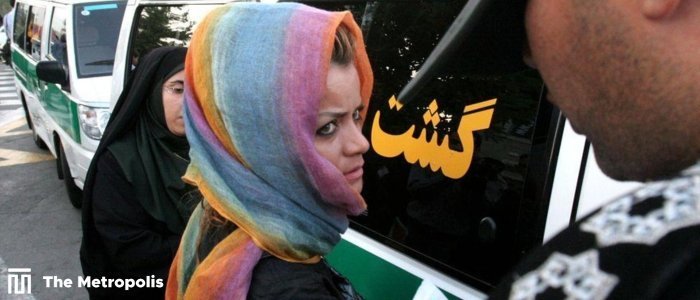Iran’s controversial morality police are tasked with enforcing the country’s strict dress code (Reuters)
Metropolis Desk-
To enforce the dress code that requires women to cover their hair and wear loose clothing, Iran’s morality police will restart its contentious street patrols.
It happens ten months after widespread protests broke out in response to Mahsa Amini’s death while she was being imprisoned for reportedly donning an “improper” headscarf. At the anti-establishment protests, women and girls have burned their headscarves or waved them in the air.
Many people now never again conceal their hair in public.
While the morality police patrols were suspended, authorities tried to enforce the dress code in other ways, but they were met with open defiance in the streets and ridicule on social media.
Women are required to wear long, loose-fitting clothing to hide their figures and cover their hair with a hijab (headscarf) under Iranian law, which is based on the nation’s interpretation of Sharia.
Since 2006, implementing those regulations has been the responsibility of specialized police units formally known as the Guidance Patrols (Gasht-e Ershad).
Kurdish woman Mahsa Amini, 22, was taken into custody by the force on September 13 in Tehran. She passed away in a hospital three days later. According to rumors, while transporting her to a “re-education center,” cops struck her head with a baton and slammed her skull on one of their cars. Her family contested the official explanation for her death, which was that it was caused by an undiagnosed medical ailment.
Protests against the morality police and the larger clerical establishment spread throughout Iran as a result of the fury that many Iranians expressed.
Security forces violently crushed the rallies, branding them as “riots” orchestrated by foreigners, killing hundreds of people and imprisoning thousands more. Additionally, seven demonstrators were put to death after what a UN expert dubbed “sham trials tarnished by allegations of torture.”
Videos and images shared on social media suggested that more women and girls were not concealing their hair in public in addition to protesting on the streets.
In response, authorities put up surveillance cameras to spot them and shut down companies that ignore dress code infractions.
Women and men who supported the rules also appeared to take enforcement into their own hands. Earlier this year, a video emerged showing a man throwing a tub of yogurt in the face of two unveiled women.
On Sunday, police spokesman Saeed Montazerolmahdi confirmed that morality police patrols had resumed across the country to “deal with those who, unfortunately, ignore the consequences of not wearing the proper hijab and insist on disobeying the norms”.
“If they disobey the orders of the police force, legal action will be taken, and they will be referred to the judicial system,” he added. However, a university student identified only as Ismaili expressed doubt that the officers would be able to impose the dress code as they had before Mahsa Amini’s death.
She told that “the number of people who don’t obey is too high right now.” The last thing they can do is employ force and violence on us because they can’t manage all of us. They cannot succeed.
While reformist MP Azar Mansouri claimed it demonstrated the “gap between the people and the state is widening,” the reformist publication Hammihan cautioned that the reinstatement of patrols could “cause chaos” in society.
Iranians also criticized the action on social media, as well as the actor Mohammad Sadeqi’s arrest on Sunday after he advised women to fight themselves when approached by the morality police.
In an Instagram post, Mr. Sadeqi asserted that the government had “declared war” against them and recommended women to arm themselves with “machetes” to defend themselves. He told cops, “Trust me, people will murder you.
A few hours later, the actor broadcast portions of a security force raid on his Tehran house, during which he was forcibly held. He was charged with “instigating violence through unconventional and illegal comments online,” according to the judiciary’s Mizan news agency.
Source- BBC News



